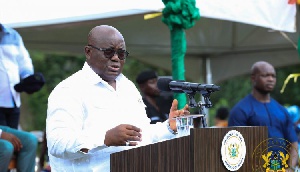Nana Addo Dankwa Akufo-Addo made several observations during his just-concluded five-day working tour of the Asante Region that ought to be further underscored for the benefit of both the general citizenry and the Communications Department of both the New Patriotic Party (NPP) and the Presidency at large (See “ ‘I’ve Shamed My Critics’ – Akufo-Addo” Starrfmonline.com/ Ghanaweb.com 8/12/18).
First of all, if he has not already done so, the newly elevated Information Minister, Mr. Kwadwo (Kojo) Oppong Nkrumah, needs to call an emergency meeting very soon and hash out some of the most significant bottlenecks that have been hobbling the operations of the abysmally dormant communications apparatus of the party.
They have to come up with a flowchart detailing the areas of the present government’s achievements that need to be highlighted for the information and education of the general public as well as the imperative revision and periodic updating of the track-record of the Akufo-Addo Administration.
I have decided to lay out this strategy publicly here in my column, because one of the most troubling issues that I confronted in Ghana during my month-long vacation, between the beginning of July and the beginning of August, soberly apprised me of the fact that too much bureaucracy may be slowing down this most dynamic and progressive government that ought not to be the case.
We shall further touch on this aspect of our discourse in due course, in future columns, that is. For now, what needs highlighting is this gaping weakness that I found in the way and manner in which the Government, in particular, the Presidency, tries to closely relate to ordinary people across the country.
Nana Akufo-Addo also travels around the country too often and much too rampantly, which must be putting a lot of stress on his health and the quality/qualitative time that he needs to haunch down and meticulously study policy matters and make the proper judgments and draw the most effective conclusions.
I am also inclined to believe that it was this unnecessary “busy-ness” that engendered the Boakye Agyarko Contretemps. Much of the work dealing with economic policies, if this is not already being done, ought to be ceded to the Vice-President, Alhaji MahamuduBawumia, and Finance Minister Kenneth Kuntunkununku Ofori-Atta.
This, of course, ought to be effected with the full collaborative involvement of the Senior Minister, Mr. Yaw Osafo-Maafo, widely known for both his economic policy experience and negotiation skills. It should not be all the time that the President’s imprimatur or zeal of approval would be needed on any major/significant document that is laid before the august House of Parliament.
Many of such duties could be better or more effectively done by delegating them to any of the three gentlemen named above, who also happen to be, perhaps, the most authoritative economic mavens in the Akufo-Addo Administration. And here also, of course, I am also thinking about Dr. Anthony Akoto Osei, the substantive Minister of Policy Monitoring and Evaluation.
But what I even want to more emphatically observe here is the urgent need for Messrs. Oppong Nkrumah and Eugene Arhin, the President’s communications point men, to knock their heads together by causing the immediate establishment of an Economic-Policy Analyses Desk under the Communications Directorate, to be composed of savvy and articulate cabinet operatives like Mr. Kwaku Kwarteng, the Deputy Finance Minister and two or three other cabinet appointees with specialty in this cardinal aspect of our national endeavors. I am here eyeing a team of approximately 6-10 specialists.
Remember the maxim: “Too many cooks spoil the broth”? We will also need a team of at least 5-10 crackerjack Economic-Policy Analysts in each and every one of the 10 regions of the country, with direct and ready access to their teammates at the Presidency or wherever the Information Minister and the Director of Communications at the Presidency decide to establish or locate the National Desk of these Economic Analysts, who would then be officially charged with speaking to pressing national economic issues and explaining these to the nation at large.
This team of economic heavyweights must be separate or discrete from the spokespersons of the various ministerial branches and agencies. But their operations must be streamlined to make both the party and the government’s communications machinery more effective.
Opinions of Saturday, 25 August 2018
Columnist: Kwame Okoampa-Ahoofe, Jr., Ph.D.
Fulfillment of campaign promises must be made sustainable in the long-term
Entertainment














